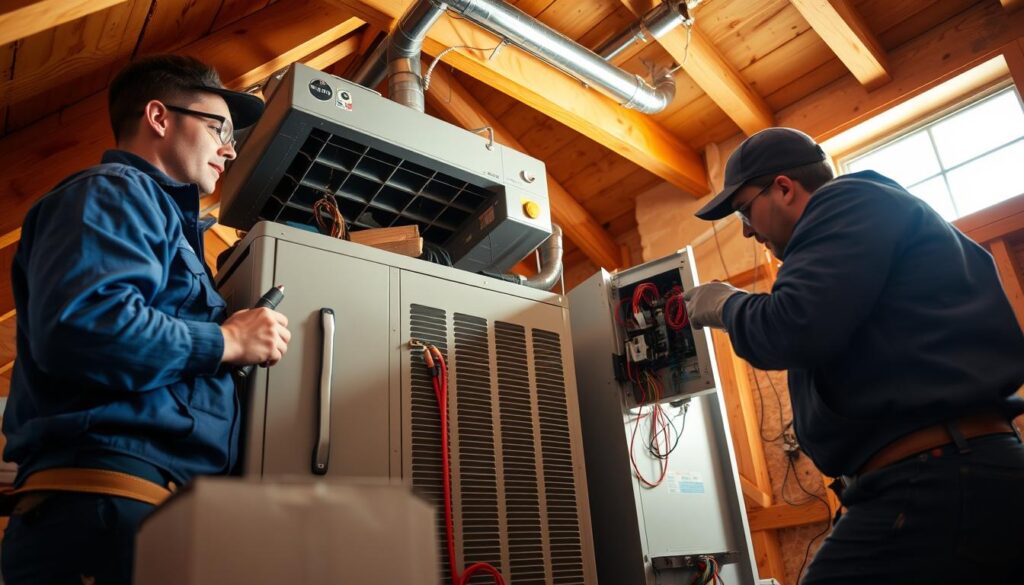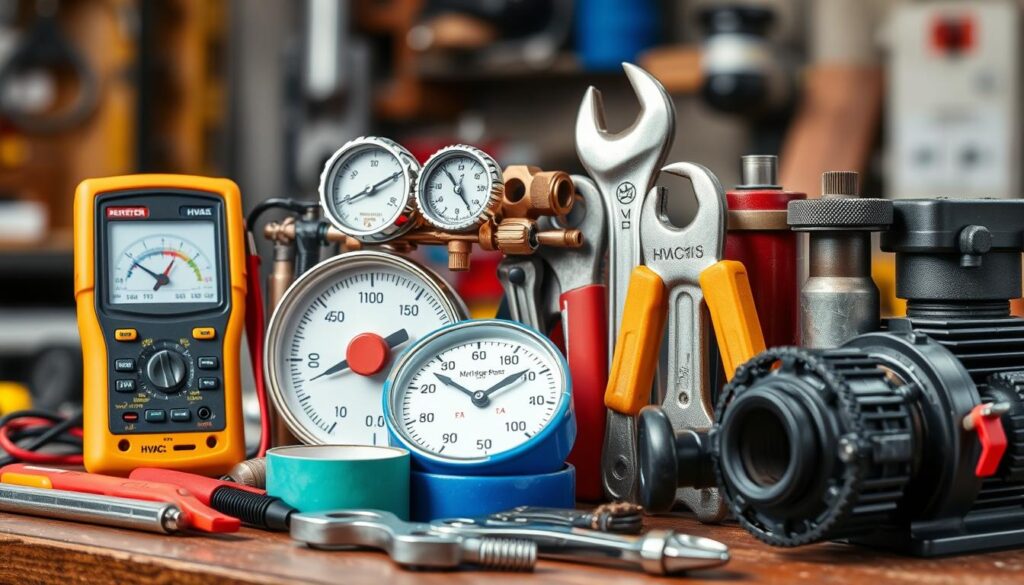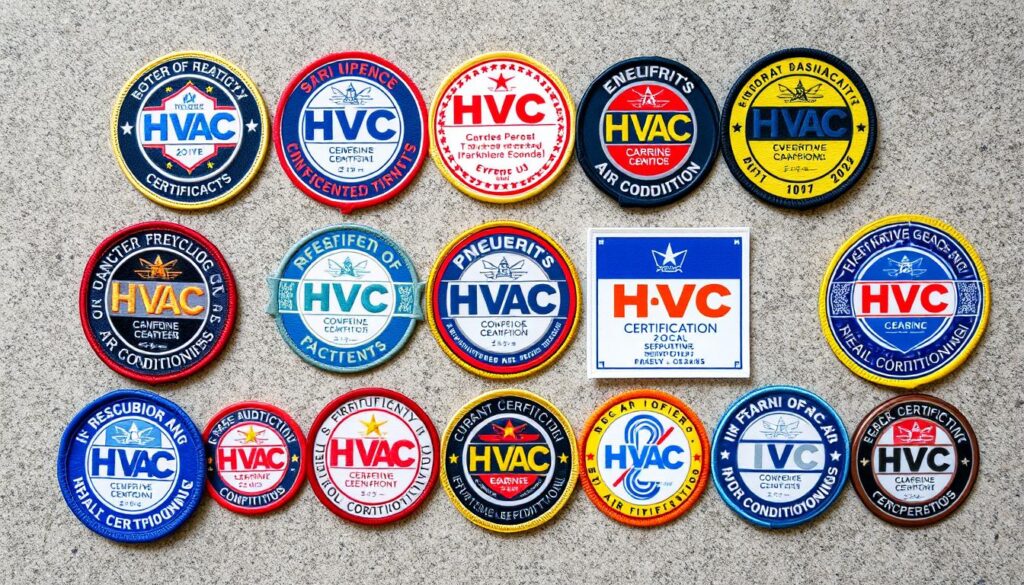Affiliate Disclosure
HVAC Guide Guys is a participant in the Amazon Services LLC Associates Program, an affiliate advertising program designed to provide a means for sites to earn advertising fees by advertising and linking to Amazon.
Are HVAC Technicians Electricians? As you explore the skilled trades, you might ask: Are HVAC technicians the same as electricians? They share some skills, but they’re different careers with their own tasks and areas of focus. This guide will show you the main differences between HVAC technicians and electricians. We’ll also look at their job outlook and the paths to becoming each a rewarding career.

Key Takeaways
- HVAC technicians and electricians have different areas of expertise. HVAC technicians work on heating, ventilation, air conditioning, and refrigeration systems. Electricians handle electrical wiring and systems.
- HVAC technicians deal with hazardous chemicals. Electricians must be careful because they work with electricity.
- The job growth rate for HVAC technicians (15%) is higher than for electricians (9%), according to the U.S. Bureau of Labor Statistics.
- HVAC technicians usually earn between $45,000 and $55,000 a year. Electricians make about $60,000 on average. They can earn more in specialized fields.
- Both HVAC technicians and electricians can expect steady job growth. This is because there’s always a need for skilled workers in new construction and keeping existing buildings running.
Table of Contents
Understanding the Fundamental Differences Between HVAC and Electrical Work
HVAC technicians and electricians have some skills in common. But they are different jobs with their own tasks, knowledge, and safety rules. Knowing these differences helps us see what each trade does.
Core Responsibilities of Each Profession
HVAC technicians work on heating, ventilation, and air conditioning systems. They install, fix, and keep these systems running well. Electricians, on the other hand, handle electrical wiring and equipment. They make sure electricity is safe and works right.
Required Skill Sets and Technical Knowledge
HVAC techs need to know about thermodynamics and refrigeration. They work with complex systems to control the climate. Electricians, however, focus on electrical theory and wiring. Both jobs need a lot of technical knowledge, but in different areas.
Safety Considerations and Regulations
Both HVAC and electrical work are very safe. HVAC techs deal with dangerous chemicals and heights. Electricians face risks of electric shock and arc flash. Both jobs follow strict rules to keep workers and people safe.
| Comparison | HVAC Technicians | Electricians |
|---|---|---|
| Employment Outlook (2022-2032) | 6% growth | 6% growth |
| Median Annual Wage (2024) | $57,424 | $64,398 |
| Program Duration | as little as 6 months full-time | as little as 7 months |
| Certifications | EPA 608 certification required to handle refrigerants | No specific certification required |
| Key Tools |
|
|
HVAC and electrical work are different jobs. They need different skills and knowledge. These differences are key to understanding what each trade does.
Explore Our HVAC Shop
Looking for top-rated HVAC tools, parts, and accessories? Visit our shop and find the perfect solution for your needs.
Visit the ShopThe Scope of HVAC Technician Work
HVAC (Heating, Ventilation, and Air Conditioning) technicians handle many tasks. They work on installing, maintaining, and fixing climate control systems. This includes air conditioners, heat pumps, furnaces, and refrigeration units. They ensure our spaces stay comfortable and energy-efficient.
Industry data shows HVAC technicians work in several areas:
- Installation: 80% of HVAC technicians install new systems in buildings and homes.
- Repair: 65% fix HVAC systems, which might mean replacing parts or fixing electrical issues.
- Maintenance: 70% do routine maintenance, like cleaning and checking systems.
- Troubleshooting: 75% quickly find and solve HVAC problems, needing to know the systems well.
- Testing and Diagnostics: 60% test HVAC systems by checking airflow and electrical parts.
- Customer Education: 55% teach customers about maintenance, suggest upgrades, and share energy-saving tips.
- Safety Protocols: 50% follow safety rules, wear protective gear, and keep up with local codes.
HVAC technicians also need to keep up with new trends and technologies. They must read industry publications and learn about the latest advancements. Their job requires technical skills, problem-solving, and great customer service. It’s a challenging yet rewarding career.
Explore Our HVAC Shop
Looking for top-rated HVAC tools, parts, and accessories? Visit our shop and find the perfect solution for your needs.
Visit the ShopAre HVAC Technicians Electricians: Clearing the Common Misconception
HVAC technicians work a lot with electrical parts, but they’re not licensed electricians. They share some skills with electricians, but their work and licenses are different.
Overlapping Skills and Knowledge
HVAC techs and electricians both know basic electrical stuff. They can read blueprints and fix electrical problems. This lets HVAC techs do some electrical work on HVAC systems.
Key Distinctions in Licensing and Certification
Electricians need a lot of training and special licenses for complex electrical jobs. HVAC techs get licenses for HVAC work, like installing and fixing heating and cooling systems.
HVAC techs can do some electrical tasks, but not all. For big electrical jobs, you should get a licensed electrician. They make sure everything is safe and follows local rules.
| Characteristic | HVAC Technicians | Electricians |
|---|---|---|
| Electrical Work Scope | Basic electrical work related to HVAC systems | Complex electrical systems, including wiring, power distribution, and panel upgrades |
| Licensing and Certification | HVAC-specific licenses and certifications | Specialized electrical licenses and certifications |
| Training and Education | HVAC-focused technical training and education | Extensive electrical-focused training and education |
| Median Salary | $48,630 per year | $60,040 per year |
In summary, HVAC techs and electricians have some skills in common. But they are different jobs with different licenses and work areas. Knowing these differences helps you choose the right person for your electrical or HVAC needs.
Educational Requirements and Training Paths
To start as an HVAC technician or electrician, you usually need a high school diploma or its equivalent. Yet, the paths to becoming one differ.
For HVAC training, you can join trade school programs. These can last from 10 months to 2 years. You’ll learn hands-on about heating, ventilation, and air conditioning systems. Some schools, like UEI College, let you get a high school diploma while learning HVAC.
Electrician apprenticeship programs are more common. They last 3-5 years. You’ll get both on-the-job training and classroom lessons, earning a wage while learning.
There are also online training options for HVAC technicians and electricians. These can be finished in 4-5 months. They offer flexibility for those with tight schedules.
Remember, some states require extra licenses or certifications for HVAC techs and electricians. Always check the rules in your area.
| Educational Requirement | HVAC Technician | Electrician |
|---|---|---|
| High School Diploma or Equivalent | ✓ | ✓ |
| Trade School Program | 10 months to 2 years | Not as common |
| Apprenticeship Program | Optional | 3-5 years |
| Online Training | 4-5 months | 4-5 months |
“HVAC training programs can typically be completed in as little as 10 months and lead to a certificate of completion.”
Explore Our HVAC Shop
Looking for top-rated HVAC tools, parts, and accessories? Visit our shop and find the perfect solution for your needs.
Visit the ShopCareer Outlook and Job Market Analysis
The job market for HVAC technicians and electricians looks good. The HVAC field is growing faster than the electrical field. The Bureau of Labor Statistics (BLS) says HVAC jobs will grow by 13% from 2018 to 2028. This is faster than the 9% growth for electricians.
More people want energy-efficient heating and cooling systems. This is because of new rules and programs that encourage green technology. As a result, there’s a big need for HVAC experts to install, fix, and keep these systems running.
Also, the HVAC field might face a worker shortage soon. Many experienced HVAC workers are getting ready to retire.
Salary Comparisons
Electricians usually make more money than HVAC technicians. In 2017, electricians made a median of $54,110, while HVAC technicians made $47,080. But, HVAC jobs are growing faster, and the demand for skilled workers is high.
Growth Projections and Industry Demand
- The HVAC industry expects a 6% growth in heating, air conditioning, and refrigeration mechanics and installers over the next nine years.
- The U.S. Bureau of Labor Statistics (BLS) says there will be 37,700 openings for HVAC technicians each year, on average, through 2032.
- HVAC technicians made a median of $51,390 in May 2022. The lowest 10% made less than $36,170, and the highest 10% made more than $82,630.
HVAC technicians have a strong demand, competitive salaries, and good growth prospects. This makes HVAC a great career choice for those in the skilled trades. It’s important to know the job needs, growth chances, and trends in HVAC and electrical work to make a smart choice.
Specialized Tools and Equipment Used in Each Field
HVAC technicians and electricians need special HVAC tools and electrician equipment for their jobs. They use unique tools and technologies in their fields. This gives us important insights.
HVAC techs use basic tools like screwdrivers and pliers. These cost between $10 and $70. They also wear safety gear like gloves and masks, priced from $15 to $100. More advanced HVAC tools include core removal tools and digital manometers, priced from $20 to $80.
| HVAC Tool Category | Price Range |
|---|---|
| Essential Manual Tools | $10 – $70 |
| Safety Tools | $15 – $100 |
| Advanced HVAC and Air Conditioning Tools | $20 – $80 |
Electrician equipment includes tools like voltmeters and wire strippers. These cost between $20 and $40. Both HVAC and electricians use computer tools and smartphones for work.
The right trade-specific technology makes a big difference. Knowing the tools and equipment helps professionals do better work. It also keeps them ahead in the industry.

“A well-equipped toolbox is the foundation of any successful HVAC or electrical professional.”
Explore Our HVAC Shop
Looking for top-rated HVAC tools, parts, and accessories? Visit our shop and find the perfect solution for your needs.
Visit the ShopWork Environment and Daily Responsibilities
HVAC technicians and electricians work in many places, like homes, offices, and factories. They face different environments, from cozy indoors to tough outdoors. HVAC techs often work in tight spots and extreme weather. Electricians might work high up or in small areas.
Physical Demands and Safety Protocols
Being physically strong is key for HVAC techs and electricians. They do a lot of manual work and face dangers. They must follow safety rules to avoid electrical shocks, falls, and harmful materials. Keeping safe is important for their health and the safety of others.
Job Site Variations and Challenges
The places where HVAC techs and electricians work can be very different. HVAC techs deal with bad weather, tight spaces, and complex systems. Electricians work at heights or in small places, needing special gear and safety steps. Both need sharp eyes, problem-solving skills, and the ability to work well under stress.
The jobs of HVAC techs and electricians are tough and varied. They need technical skills, safety knowledge, and flexibility to do well.
“The ability to adapt to varying work environments and prioritize safety is essential for both HVAC technicians and electricians to excel in their professions.”
Professional Certifications and Licensing Requirements
Starting a career in the HVAC industry means understanding certifications and licenses. These show you’re skilled and follow safety and industry standards.
HVAC techs often get certified by HVAC Excellence or NATE (North American Technician Excellence). These certifications prove your skills in installation, maintenance, and fixing problems. You also need an EPA (Environmental Protection Agency) certification for working with refrigerants.
Electricians, on the other hand, need a state license. This usually means an apprenticeship and a big exam. It makes sure they know their stuff and follow safety rules.
Both HVAC techs and electricians must keep learning to keep their licenses. This keeps them current with new tech, standards, and laws. It helps them give top-notch service to their clients.

In short, certifications and licenses show HVAC techs and electricians are serious about their work. They ensure safe, efficient, and reliable services. Knowing about these requirements is key for those starting in these fields and for those looking for skilled professionals.
Conclusion
Choosing between an HVAC technician and an electrician career depends on your interests and skills. Both jobs offer stable work and good pay. HVAC might interest those who love climate control, while electrical work appeals to those who enjoy power systems.
Think about job growth, salary, work environment, and skills needed. Both fields allow for specialization and growth. HVAC technicians, for example, can get certifications like Section 608 Technician Certification and NATE Certification.
Your HVAC vs electrician career choice should match your interests and strengths. Both HVAC and electrical work are in demand and rewarding in the U.S.

